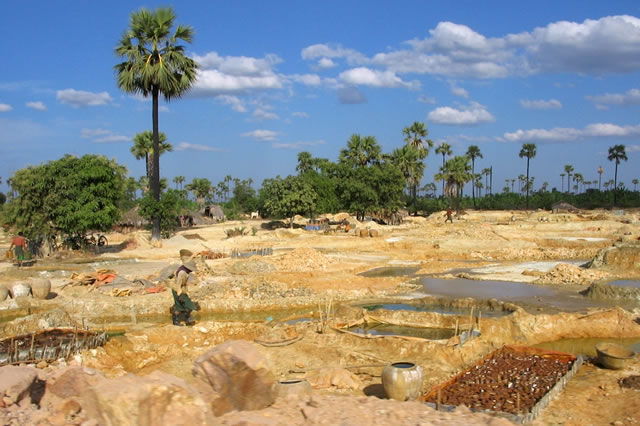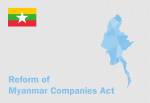Amnesty International slams abusive, poorly regulated Myanmar mining industry

Amnesty International is calling for investigations by Canada and China into potential human rights abuses and illegal activity relating to the Monywa copper mining operation in Myanmar.
Article Source: Angela Kean, SNL Financial
Amnesty International is calling for investigations by Canada and China into potential human rights abuses and illegal activity relating to the Monywa copper mining operation in Myanmar.
The human rights advocate claims large-scale forced evictions and serious pollution linked to the operation have destroyed livelihoods and exposed thousands of people to health risks.
Amnesty International said it also found evidence of illegal activity including possible breaches of economic sanctions.
"Myanmar offers the perfect storm of a rich natural resource base, a weak legal system and an economy dominated by military and special interests," Meghna Abraham, Amnesty International corporate crimes researcher, said in February.
"The government has forcibly evicted people, crushed all attempts at peaceful protest and displayed a complete unwillingness to hold companies to account."
The Monywa complex comprises the Sabetaung and Kyisintaung, or S&K, and the Letpadaung copper mines and is jointly owned by China's Wanbao Mining Ltd. and the military-backed Union of Myanmar Economic Holdings. The Canadian miner formerly known as Ivanhoe Mines, now Turquoise Hill Resources Ltd., and Myanmar government-owned Mining Enterprise No. 1 were the original joint venture partners in the project from 1996 until March 2007, when Ivanhoe divested its 50% stake into the third-party Monywa Trust. In 2010, Wanbao parent China North Industries Corp., also known as NORINCO, and Union of Myanmar Economic Holdings entered into an agreement over the Monywa project.
Amnesty International alleges that thousands of people in the 1990s were evicted to make way for Ivanhoe's mining investment and that the company was aware of the situation but did nothing. Thousands more people have allegedly been evicted since 2011 to make way for the new Letpadaung mine that is still under construction and has been continually delayed due to ongoing community protests. In late December 2014, a clash between Myanmar authorities and protesters left one person dead and a dozen wounded. Protests were ignited after Wanbao announced it would resume construction at the site after a two-year delay and villagers were ordered to vacate their land to enable the building of a fence around the mine area.
Vicky Bowman, director of the Myanmar Centre for Responsible Business (MCRB) told SNL Metals & Mining that mining companies in Myanmar are generally poorly regulated. "Very few have environmental impact assessments and established environmental management plans, let alone have made them public," she said.
However, the Letpadaung mine is a rare exception in that it has a publicly available EIA and EMP, which were completed by Australian consulting firm Knight Piesold. The problem is that neither have been the subject of public consultation with all stakeholders, including national-level nongovernmental organizations, and neither the government nor Wanbao appear to have any plans to engage with stakeholders, according to Bowman.
She said the EIA is incomplete due to the government not allowing Wanbao to engage with the most affected rights holders in the villages to be resettled. "It is also unclear how far the commitments in the draft EMP are being followed as the company is not engaging face to face with those who have the most serious concerns about its operations, and has not established any plans for community-based monitoring that could build trust," Bowman said.
Acid factory a health risk Most of the sulfuric acid needed for the S&K mine within the Monywa complex is supplied by a factory operated by Union of Myanmar Economic Holdings and located about 200 meters from Kankone village. Villagers told Amnesty International that they suffer respiratory, skin and eye problems that they believe are caused by the factory. They also described damage to crops in fields adjacent to the factory.
According to Amnesty International, Union of Myanmar Economic Holdings set up the factory in 2007 without approval from the Ministry of Industry, and operated it without permits until July 2013, when the ministry gave permission for the continued operation of the factory. The Letpadaung mine and the associated factory are the focus of a parliamentary commission, and the Myanmar government has established an implementation committee to address the recommendations put forward by the commission.
Bowman said the mine has been the subject of the most extensive intragovernment consideration of any foreign investment project in Myanmar, with numerous discussions and visits to the mine. However, it is still unclear as to what has changed, particularly with respect to the regulation of pollution from the acid factory.
"Neither government nor company has engaged directly with or responded to the questions of civil society organizations," Bowman said. "This means that the activities of the committee do not inspire public trust. Some discussion has taken place in the margins of the Extractives Industries Transparency Initiative, but it remains to be seen whether this will provide answers to the issues being raised by communities and those working with them."
Miners respond to allegations Wanbao Mining, Turquoise Hill Resources-owner Rio Tinto and Ivanhoe Mines founder Robert Friedland responded to Amnesty International's allegations in its report, "Open for Business? Corporate Crime and Abuses at Myanmar Copper Mine." Friedland, who founded Ivanhoe in 1994, labeled Amnesty International's claims a "fishing expedition," saying that Ivanhoe had "severed all connection" to the Myanmar assets almost four years ago, when the assets were sold by the Monywa Trust.
"I perceive a fishing expedition, the purpose of which, at least as it relates to me, would appear to involve adding two parts innuendo to two parts insinuation and suggesting that the answer is five," he said in a Jan. 30 letter to Amnesty International. "I have no interest in contributing to an exercise in sensationalism." Friedland noted that he resigned as a director and CEO of Ivanhoe in 2012, the same year Rio Tinto took control of the company and renamed it Turquoise Hill Resources.
In his letter to Amnesty International, he took the opportunity to "set the record straight" by emphasizing that Ivanhoe was never involved in the development or mining of the Letpadaung deposit during the time that the company was a partner in the Monywa project. Friedland also stated that Ivanhoe was never secretive about its ownership of the project and disputed Amnesty International's claim that the Monywa Trust was created solely as a means to obfuscate the ownership of the Myanmar assets.
"The company retained no interest in the Myanmar assets nor had any interest in any other assets in Myanmar," he said. "The company had no right to oversee or otherwise involve itself in the trustee's efforts to dispose of the Myanmar assets." Meanwhile, Wanbao said in its letter to Amnesty International that the company undertook an environmental and social impact assessment that took two years to complete, which was based on community consultations and followed an "exhaustive process."
"During the consultation process a number of environmental and technical issues were raised and these issues were able to be addressed and resolved," Wanbao said. The company claims its ESIA has undergone extensive reviews over a 12-month period by a team formed by the Ministry of Environment Conservation and Forestry and comprising top environmental and social experts as well as ministries, nongovernmental organizations and community representatives. Wanbao added that since March 2014, when Amnesty International visited the mine site, its relationship with the community has been "steadily improving," with 71% of impacted villagers consulted across 35 villages supporting the project.
The company said it had gauged community interest in receiving regular payments of between US$70 and US$120 a month for the life of the mine, in addition to land compensation, until they get a job with Wanbao or if they turn down a job offer. Villagers take legal action over tin mine damage The Monywa operation is not the only project disrupting communities in Myanmar, with the Heinda tin mine understood to also be causing serious environmental damage.
The mine is owned by Thailand's Myanmar Pongpipat Co. in partnership with the Myanmar government. The dumping of material from the mine into a river is believed to have caused flooding that has damaged houses, plantations and farmland, and contaminated drinking water supplies, affecting the health of villagers. In May 2014, Myaung Pyo villagers in the Dawei district launched legal action against Myanmar Pongpipat and state-owned Mining Enterprise No. 2, seeking compensation for the damage caused by the Heinda mine.
"The mine has not engaged adequately with communities to address these problems and villagers are now suing the mine for damages under tort, in the absence of other available remedies," Bowman said. "Since the mine had successfully been running for decades without causing such damage, prior to it being leased to [Myanmar Pongpipat Co.], it is not clear whether one factor leading to the damage is a short lease term and a lack of regulation and enforcement, which combined are leading the mine to high-grade the asset without taking the time to make appropriate HSE efforts."
Moves to encourage greater transparency Bowman said the MCRB has participated in mining-related discussions with government and the Myanmar Federation of Mining Associations to raise awareness of international standards such as those of the IFC and good practices such as those of the International Council of Mining and Metals. Good practice in community engagement in mining was also the subject of a two-day MCRB multistakeholder workshop in January which involved government, companies and civil society.
The center has also contributed advice on operational-level grievance mechanisms in the context of the Extractives Industries Transparency Initiative. However, Wanbao failed to attend despite being invited, according to Bowman. "Their failure to engage with civil society groups is one contributing factor to ensuring that the company continues to lack a social license to operate," she said.
Read also
- Mining Sector
- Jade Mining in Kachin State – Environmental Management Plans
- Towards Responsible Gold Mining in Sagaing Region
- River Sand Extraction in Myanmar
- Experts object to firms’ plans to mine sand in Tanintharyi Region
 English
English မြန်မာ
မြန်မာ မြန်မာ (unicode)
မြန်မာ (unicode)










